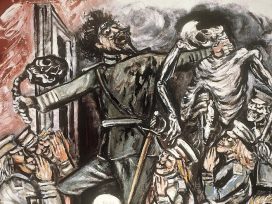Living dead democracy
Overlapping crises, enforced political passivity, a new political normal: all things that gradually dismantle a democracy. Ferenc Laczó talks the death of democracy in a new episode of Gagarin.
Long standing Eurozine contributor, Ferenc Laczó joins editor-in-chief Réka Kinga Papp to talk about how a democracy can be alive and dead at the same time. With the Hungarian example as backdrop, they describe what democratic disintegration looks like – the early indicators, the pace, and how to identify democratic death threats.
Laczó joined the discussion about how democracies die in the Eurozine focal point ‘The writing on the wall’ with his article ‘How democracies transform, fast and slow’.
Read Ferenc Laczó’s articles in Eurozine, including the debate on the death of democracies discussed in the episode :
Bloodless democracy?
A response to John Keane
People power?
A reply to James Miller
Anthropocentrism and democracy in planetary times
A response to John Keane
How democracies transform, fast and slow
A response to John Keane
This episode is an edited version of a longer conversation, which is available in its entirety only to our Patrons. You can get access to the full episode, and more giveaways by becoming a Patron for as little as €5 a month on Patreon.
Please subscribe to Gagarin on Spotify, Apple podcasts, Castbox, Stitcher, Soundcloud or wherever you get your podcasts, and leave a review so more people can find us. You can also subscribe to our newsletter, so you’ll always know what’s truly worth thinking about.
Published 11 August 2023
Original in English
In collaboration with
In focal points
- Living dead democracy
- Why Parliaments?
- Spelling out a law for nature
- No more turning a blind eye
- The end of Tunisia’s spring?
- Protecting nature, empowering people
- Albania: Obstructed democracy
- Romania: Propaganda into votes
- The myth of sudden death
- Hungary: From housing justice to municipal opposition
Newsletter
Subscribe to know what’s worth thinking about.
Related Articles

The Courts have acquiesced, the populace is compliant and the Democratic Party is splintered. Without any way to make their opposition felt, Trump’s opponents’ only hope is that the economy will cause MAGA voters to rethink.

Elected in 2022 on a wave of popular hope, Colombia’s leftwing leader Gustavo Petro has failed to negotiate peace with the country’s armed groups and embarked on a ruinous tariff war with Donald Trump. A portrait of the president hampered by his own revolutionary nostalgia.












